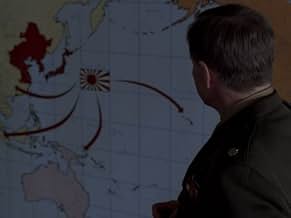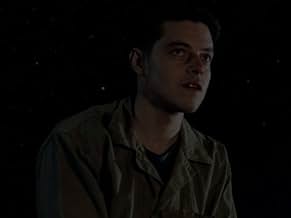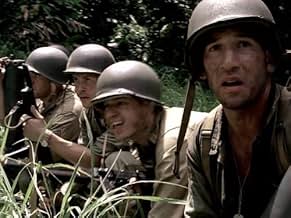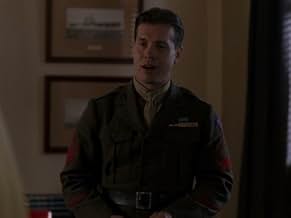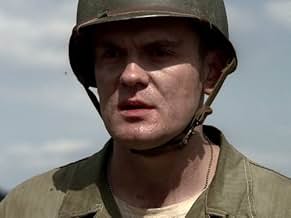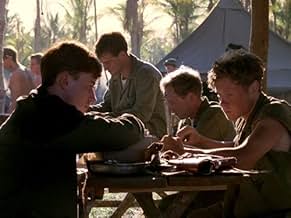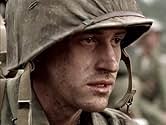Il teatro del Pacifico della seconda guerra mondiale, visto attraverso gli occhi di diversi giovani marines.Il teatro del Pacifico della seconda guerra mondiale, visto attraverso gli occhi di diversi giovani marines.Il teatro del Pacifico della seconda guerra mondiale, visto attraverso gli occhi di diversi giovani marines.
- Vincitore di 8 Primetime Emmy
- 36 vittorie e 44 candidature totali
Sfoglia gli episodi
Recensioni in evidenza
"The Pacific" is Tom Hanks and Steven Spielberg's epic 200 million dollar miniseries from the creators of the brilliant 2001 series "Band Of Brothers'. Much like with Band Of Brothers, The Pacific gives us an unflinching look at the horrors of war, not just the physical but the mental horrors these men must face. As an audience you are pulled through this experience, watching in horror as limbs are torn from bodies and men are burned and mutilated. In a way even more distressing is watching the emotional scars and effects this has on our main characters. This is not a perfect series and does suffer from some major flaws but overall it's an extremely harrowing experience but one that is needed in an age where war is often glorified, this series does anything but that.
Narrative and overall story: The Pacific is based primarily on two memoirs of U.S. Marines, With the Old Breed: At Peleliu and Okinawa by Eugene Sledge and Helmet for My Pillow by Robert Leckie. The miniseries follows both these marines Sledge (played by joe mazzello) and Leckie (James Badge Dale) there is also the addition of marine John Basilone (Jon Seda) but he is a lesser focus. Now unlike Band of Brothers we follow these characters separately as they are part of different divisions, the first few episodes follow Leckie and his experiences, the latter on Sledge. In a way this is both an interesting way of narration but also maybe the biggest flaw of the series.
This spilt narration gives us two very separate journeys which in a way bonds us closer to the characters. The downfall is that Leckie's story is just simply not as interesting as Sledges, from the moment Sledge is introduced to us i felt an instant sympathy and connection with him, here is this shy, awkward eighteen year old desperately longing to fight in the war but unable to do so thanks to a heart mummer, of course his determination gets the best of him and enlists. The character and his overall story is simply miles more compelling than Leckie's thats what makes the first three or four episodes somewhat lackluster. When the sole focus is on Sledge this series reaches its incredible potential and becomes something truly amazing, Sledge and his journey is really the heart and soul of this series.
Acting: With such a depressing and intense subject matter first class acting was expected and the pacific delivers. Every single cast member gives a great performance, its gripping and believable acting at its best. The stars are undoubtedly Joe Mazzello who plays Sledge and Rami Malek who plays Corporal Merriell Shelton or "Snafu", a highly intriguing character who forms a close friendship with Sledge. Both give Emmy worthy performances and in Malek's case i would say Oscar worthy. These are two very complex and incredible performances. Mazzello plays our lead which such an intense and subtle power: his character goes from a naive and passive teenager to hardened killing machine full of rage it is an incredible character arc and Mazzello plays it to perfection. As the series comes to a close we really see what Mazzello can do: Sledge is beginning to lose himself, he has become ruthless and in one single pivotal scene he regains his humanity, his compassion and his redemption. Its a truly powerful scene and one in which Mazzello does not utter one word, his face says everything and its heartbreaking. In fact that is Mazzello main strong point, his ability to convey much more than what is going on just by his eyes and face, there is so much complex emotion behind his eyes it makes for a fascinating watch. Rami Malek gives the most impressive performance of the series playing "Snafu". His character is incredibly creepy and odd, obviously numbed by the horrors of the war, but there is something there that makes the audience warm to him. Malek completely becomes the role, every mannerism, twitch, blink of the eye is perfectly done. lines such as "I like to watch the new guys sweat." are said with such odd intensity its actually mind blowing. I will call this performance perfect which is a very rare thing indeed, if only Malek could win an Oscar because this performance truly deserves the highest acclaim. Malek and Mozzello also have fantastic chemistry, playing off each other perfectly helping to only further this touching friendship.
Direction: remember the opening sequence of "Saving Private Ryan"? well imagine that times 20. I would say this is the most realistic portrayal of what an actual battle must have felt like. The battle scenes are simply epic and wonderfully directed, even if you hate everything else anyone can see the direction is incredible within this series.
Overall: the major flaw of this series if the first 4 episodes they simply don't have the emotional impact of the rest, in fact they border on dull. However as soon as Sledge and Snafu become our main focus this series becomes a true epic. This series will take you on a haunting experience, you will be horrified, you will be moved, you will laugh, you will cry. As long as you stick with it through the first few episodes you will not regret it.
Narrative and overall story: The Pacific is based primarily on two memoirs of U.S. Marines, With the Old Breed: At Peleliu and Okinawa by Eugene Sledge and Helmet for My Pillow by Robert Leckie. The miniseries follows both these marines Sledge (played by joe mazzello) and Leckie (James Badge Dale) there is also the addition of marine John Basilone (Jon Seda) but he is a lesser focus. Now unlike Band of Brothers we follow these characters separately as they are part of different divisions, the first few episodes follow Leckie and his experiences, the latter on Sledge. In a way this is both an interesting way of narration but also maybe the biggest flaw of the series.
This spilt narration gives us two very separate journeys which in a way bonds us closer to the characters. The downfall is that Leckie's story is just simply not as interesting as Sledges, from the moment Sledge is introduced to us i felt an instant sympathy and connection with him, here is this shy, awkward eighteen year old desperately longing to fight in the war but unable to do so thanks to a heart mummer, of course his determination gets the best of him and enlists. The character and his overall story is simply miles more compelling than Leckie's thats what makes the first three or four episodes somewhat lackluster. When the sole focus is on Sledge this series reaches its incredible potential and becomes something truly amazing, Sledge and his journey is really the heart and soul of this series.
Acting: With such a depressing and intense subject matter first class acting was expected and the pacific delivers. Every single cast member gives a great performance, its gripping and believable acting at its best. The stars are undoubtedly Joe Mazzello who plays Sledge and Rami Malek who plays Corporal Merriell Shelton or "Snafu", a highly intriguing character who forms a close friendship with Sledge. Both give Emmy worthy performances and in Malek's case i would say Oscar worthy. These are two very complex and incredible performances. Mazzello plays our lead which such an intense and subtle power: his character goes from a naive and passive teenager to hardened killing machine full of rage it is an incredible character arc and Mazzello plays it to perfection. As the series comes to a close we really see what Mazzello can do: Sledge is beginning to lose himself, he has become ruthless and in one single pivotal scene he regains his humanity, his compassion and his redemption. Its a truly powerful scene and one in which Mazzello does not utter one word, his face says everything and its heartbreaking. In fact that is Mazzello main strong point, his ability to convey much more than what is going on just by his eyes and face, there is so much complex emotion behind his eyes it makes for a fascinating watch. Rami Malek gives the most impressive performance of the series playing "Snafu". His character is incredibly creepy and odd, obviously numbed by the horrors of the war, but there is something there that makes the audience warm to him. Malek completely becomes the role, every mannerism, twitch, blink of the eye is perfectly done. lines such as "I like to watch the new guys sweat." are said with such odd intensity its actually mind blowing. I will call this performance perfect which is a very rare thing indeed, if only Malek could win an Oscar because this performance truly deserves the highest acclaim. Malek and Mozzello also have fantastic chemistry, playing off each other perfectly helping to only further this touching friendship.
Direction: remember the opening sequence of "Saving Private Ryan"? well imagine that times 20. I would say this is the most realistic portrayal of what an actual battle must have felt like. The battle scenes are simply epic and wonderfully directed, even if you hate everything else anyone can see the direction is incredible within this series.
Overall: the major flaw of this series if the first 4 episodes they simply don't have the emotional impact of the rest, in fact they border on dull. However as soon as Sledge and Snafu become our main focus this series becomes a true epic. This series will take you on a haunting experience, you will be horrified, you will be moved, you will laugh, you will cry. As long as you stick with it through the first few episodes you will not regret it.
10follis12
The war in the Pacific was a hell of a lot different than the war in Europe. Of course both where terrible - full of death, sacrifice, and heroism. However, it seems the soldier's stories from the European theater have gotten a lot more press.
The US Marines in the Pacific lived like animals in the most horrible environments imaginable. On top of fighting an enemy committed to kill them at all cost and never surrender, they battled the mud, heat, malaria, near starvation, and isolation for months on end.
Basically, it was a total nightmare, and the heroism of all the US Marines in the Pacific theater is nothing short of awe inspiring. The Pacific tells this story well. It is a must see on the topic of WW2.
The US Marines in the Pacific lived like animals in the most horrible environments imaginable. On top of fighting an enemy committed to kill them at all cost and never surrender, they battled the mud, heat, malaria, near starvation, and isolation for months on end.
Basically, it was a total nightmare, and the heroism of all the US Marines in the Pacific theater is nothing short of awe inspiring. The Pacific tells this story well. It is a must see on the topic of WW2.
The Pacific... every time I come across this series I always want to watch it again. The show really shows you what the soldiers that fought in WW2 felt and went through. It's series like this that keep the memory of those brave soldiers who fought for their country alive. And also, the opening theme is... Just hear it for yourself.
I'm guessing most of us watched 'The Pacific' for at least one of the following 3 reasons:
1. We have an interest in history, particularly in WW2.
2. We are fans of movies and television shows (well, the good ones anyway)
3. We had seen - and loved - the previous Hanks/Spielberg co-production 'Band Of Brothers' and expected a mini-series on the same level.
Now from reading some of the reviews here I gather that third reason was the most important one for many viewers - and it's also why 'The Pacific' apparently left quite a few people disappointed. As for me, I wasn't disappointed - I was devastated.
I'm a lucky man; I've never had to suffer through a war. But I had relatives who did, and though they're all long gone now, I'll never forget their stories. War is the most extreme and outrageous experience humans can possibly endure, but there are many different aspects and layers to it, because a war is not a single experience: it's all the experiences of all the individuals who have to suffer through it, and no single film or TV show can cover all of them. 'Band Of Brothers' focused on certain aspects of a war, and it chose a narrative that helped emphasize what the core theme of the series was: the brotherhood of war. It was about people who retain their humanity and form the closest of bonds under the worst, most horrific circumstances.
That inherently human element in 'BoB' was also why we could identify so well with the protagonists, and why we were - and still are - so deeply touched by what they had to go through. It's an outstandingly well made series, and I can't imagine how those experiences by those soldiers could have been portrayed better. Which is why 'The Pacific' doesn't even try. Instead, it goes almost in the opposite direction by choosing to focus on the sheer insanity of war: the relentless horror and despair of people losing their humanity and their struggle to regain it. Of course, just like 'BoB' it's also about the heroic sacrifices of those brave soldiers, but if there is a core theme in 'The Pacific' it's that of trauma: the trauma of having your humanity stripped from you and your personality shattered; the trauma of witnessing the complete disintegration of everything you thought you were and knowing you'll never be whole again.
What we see in 'The Pacific' is Hell, plain and simple. It's scores and scores of anonymous, young Japanese soldiers running senselessly into machine gun fire, wave after wave, until the piles of their bodies are so high they block the sight for the machine gun; it's American soldiers barely older than kids in despair or completely numb from the sheer amount of random death around them; it's vibrant young men turning into barely alive husks whose only remaining focus is to survive - which means they have to kill other barely alive young men who will stop at nothing to kill them in turn; it's kids killing other kids like rats by any means at their disposal: guns, knives, flame-throwers or with their bare hands; it's people living among the rotting corpses of their dead comrades and enemies and completely losing any regard for human life. And the few moments where we witness how those kids get a brief taste of how precious and beautiful life could be make their fate all the more heartbreaking.
Over large stretches, 'The Pacific' is devastating and depressing to watch, and though I found it never less than compelling, it's actually easy to see why many viewers who had hoped for a similarly engaging experience as in 'BoB' were left disappointed. But this is a different story about different people who fought in a different theater of the war and who went through different experiences, and once you stop comparing it to the story of the men in Easy Company from 'BoB', you'll find that, while different, in terms of sheer quality 'The Pacific' is every bit as good and as much of an outstanding achievement as its more popular predecessor.
The realism, the performances, the music and the production values in the series are superb (this was a 200 million production after all), and the attention to historic detail is simply staggering. As for me, witnessing what these men went through left me devastated; yet I am grateful I've watched 'The Pacifc': because in its relentless depiction of the horrors of war it honors the sacrifice these brave young soldiers made in the hope future generations wouldn't have to do the same. I originally rated this series 9 stars out of 10, but upon a recent rewatch and with more knowledge of the war in the Pacific theater, it's clear that this is a 10/10. Outstanding.
Favorite films: IMDb.com/list/mkjOKvqlSBs/
Lesser-Known Masterpieces: imdb.com/list/ls070242495/
Favorite TV-Shows reviewed: imdb.com/list/ls075552387/
1. We have an interest in history, particularly in WW2.
2. We are fans of movies and television shows (well, the good ones anyway)
3. We had seen - and loved - the previous Hanks/Spielberg co-production 'Band Of Brothers' and expected a mini-series on the same level.
Now from reading some of the reviews here I gather that third reason was the most important one for many viewers - and it's also why 'The Pacific' apparently left quite a few people disappointed. As for me, I wasn't disappointed - I was devastated.
I'm a lucky man; I've never had to suffer through a war. But I had relatives who did, and though they're all long gone now, I'll never forget their stories. War is the most extreme and outrageous experience humans can possibly endure, but there are many different aspects and layers to it, because a war is not a single experience: it's all the experiences of all the individuals who have to suffer through it, and no single film or TV show can cover all of them. 'Band Of Brothers' focused on certain aspects of a war, and it chose a narrative that helped emphasize what the core theme of the series was: the brotherhood of war. It was about people who retain their humanity and form the closest of bonds under the worst, most horrific circumstances.
That inherently human element in 'BoB' was also why we could identify so well with the protagonists, and why we were - and still are - so deeply touched by what they had to go through. It's an outstandingly well made series, and I can't imagine how those experiences by those soldiers could have been portrayed better. Which is why 'The Pacific' doesn't even try. Instead, it goes almost in the opposite direction by choosing to focus on the sheer insanity of war: the relentless horror and despair of people losing their humanity and their struggle to regain it. Of course, just like 'BoB' it's also about the heroic sacrifices of those brave soldiers, but if there is a core theme in 'The Pacific' it's that of trauma: the trauma of having your humanity stripped from you and your personality shattered; the trauma of witnessing the complete disintegration of everything you thought you were and knowing you'll never be whole again.
What we see in 'The Pacific' is Hell, plain and simple. It's scores and scores of anonymous, young Japanese soldiers running senselessly into machine gun fire, wave after wave, until the piles of their bodies are so high they block the sight for the machine gun; it's American soldiers barely older than kids in despair or completely numb from the sheer amount of random death around them; it's vibrant young men turning into barely alive husks whose only remaining focus is to survive - which means they have to kill other barely alive young men who will stop at nothing to kill them in turn; it's kids killing other kids like rats by any means at their disposal: guns, knives, flame-throwers or with their bare hands; it's people living among the rotting corpses of their dead comrades and enemies and completely losing any regard for human life. And the few moments where we witness how those kids get a brief taste of how precious and beautiful life could be make their fate all the more heartbreaking.
Over large stretches, 'The Pacific' is devastating and depressing to watch, and though I found it never less than compelling, it's actually easy to see why many viewers who had hoped for a similarly engaging experience as in 'BoB' were left disappointed. But this is a different story about different people who fought in a different theater of the war and who went through different experiences, and once you stop comparing it to the story of the men in Easy Company from 'BoB', you'll find that, while different, in terms of sheer quality 'The Pacific' is every bit as good and as much of an outstanding achievement as its more popular predecessor.
The realism, the performances, the music and the production values in the series are superb (this was a 200 million production after all), and the attention to historic detail is simply staggering. As for me, witnessing what these men went through left me devastated; yet I am grateful I've watched 'The Pacifc': because in its relentless depiction of the horrors of war it honors the sacrifice these brave young soldiers made in the hope future generations wouldn't have to do the same. I originally rated this series 9 stars out of 10, but upon a recent rewatch and with more knowledge of the war in the Pacific theater, it's clear that this is a 10/10. Outstanding.
Favorite films: IMDb.com/list/mkjOKvqlSBs/
Lesser-Known Masterpieces: imdb.com/list/ls070242495/
Favorite TV-Shows reviewed: imdb.com/list/ls075552387/
Please, for the love of God, please do not overlook this miniseries. I have seen way too many people who don't bother to see The Pacific because it wasn't like Band of Brothers. This was in no way, shape, or form meant to be like BoB. If you have studied WW2 at all, you would know that the war in the Pacific was a totally different war than the European theater.
I loved Band of Brothers, it was a great and realistic series of the harsh realities of warfare and the scars it can leave. The Pacific was much harder to watch than BoB ever was. BoB was all about the bonds formed in combat and how this can tear people apart. This grim series displayed how completely unprepared the US military was mentally for how truly horrific this war would be. Not only were you fighting the unpredictable and relentless Japanese soldiers, but you were also fighting the terrain. The dense woods, the heavy rain, the thick mud. Not to mention all the diseases that came with these harsh conditions. Water was a luxury in a lot of situations. The filmmakers brilliantly showed how this affected the fighting men, who became virtually hollow shells, their sanity teetering on the edge of their knives.
The Japanese killed everyone without remorse. One particular scene that gave me chills to witness was in the latter half of the series when a group of civilians was slaughtered by a Japanese machine gun nest while running to the American forces. One person, a child, started to crawl slowly to the lines, a couple bullet wounds on his body. One of the combat rookies wanted to run in to help the poor boy, but was kept back so they would not be shoot too. All the Marines could do was watch, as the helpless child was brutally killed after a bullet from that machine gun emplacement hit him in the back of the head and his body went limp instantaneously.
This is on par with Saving Private Ryan, another collaboration between Tom Hanks and Steven Spielberg, as one of the most horrific, gruesome, and realistic war dramas ever put to film. I highly recommend giving it a watch, but be warned: this series is not for the faint of heart.
I loved Band of Brothers, it was a great and realistic series of the harsh realities of warfare and the scars it can leave. The Pacific was much harder to watch than BoB ever was. BoB was all about the bonds formed in combat and how this can tear people apart. This grim series displayed how completely unprepared the US military was mentally for how truly horrific this war would be. Not only were you fighting the unpredictable and relentless Japanese soldiers, but you were also fighting the terrain. The dense woods, the heavy rain, the thick mud. Not to mention all the diseases that came with these harsh conditions. Water was a luxury in a lot of situations. The filmmakers brilliantly showed how this affected the fighting men, who became virtually hollow shells, their sanity teetering on the edge of their knives.
The Japanese killed everyone without remorse. One particular scene that gave me chills to witness was in the latter half of the series when a group of civilians was slaughtered by a Japanese machine gun nest while running to the American forces. One person, a child, started to crawl slowly to the lines, a couple bullet wounds on his body. One of the combat rookies wanted to run in to help the poor boy, but was kept back so they would not be shoot too. All the Marines could do was watch, as the helpless child was brutally killed after a bullet from that machine gun emplacement hit him in the back of the head and his body went limp instantaneously.
This is on par with Saving Private Ryan, another collaboration between Tom Hanks and Steven Spielberg, as one of the most horrific, gruesome, and realistic war dramas ever put to film. I highly recommend giving it a watch, but be warned: this series is not for the faint of heart.
Lo sapevi?
- QuizDuring his audition, Rami Malek (Snafu) noticed that the man running the camera was not, as is typical, a young assistant, but an older gentleman who was doing some "very elegant camera work." Midway through his scene, he realized that the camera operator was actually Steven Spielberg.
- BlooperAt about 1:20 into the opening credits, a Navy ship sails into view from the left. On the bow is a small vertical mast (the jackstaff) flying a small flag (the Jack). The Jack and jackstaff are only used when the ship is anchored or moored never when it is underway.
- ConnessioniFeatured in The 62nd Primetime Emmy Awards (2010)
I più visti
Accedi per valutare e creare un elenco di titoli salvati per ottenere consigli personalizzati
- How many seasons does The Pacific have?Powered by Alexa
- Will there be any actors in "The Pacific" that also played in the original BoB?
- Why does Shelton (Snafu) take the gold teeth from the dead Japanese soldiers?
- Leckie gives a pistol to Dr Grant while he's on leave, what type of pistol is it? Why did he give it to Grant?
Dettagli
- Data di uscita
- Paesi di origine
- Sito ufficiale
- Lingue
- Celebre anche come
- Untitled World War II Pacific Theater Project
- Luoghi delle riprese
- Aziende produttrici
- Vedi altri crediti dell’azienda su IMDbPro
- Tempo di esecuzione1 ora
- Colore
- Mix di suoni
- Proporzioni
- 1.78 : 1
Contribuisci a questa pagina
Suggerisci una modifica o aggiungi i contenuti mancanti





